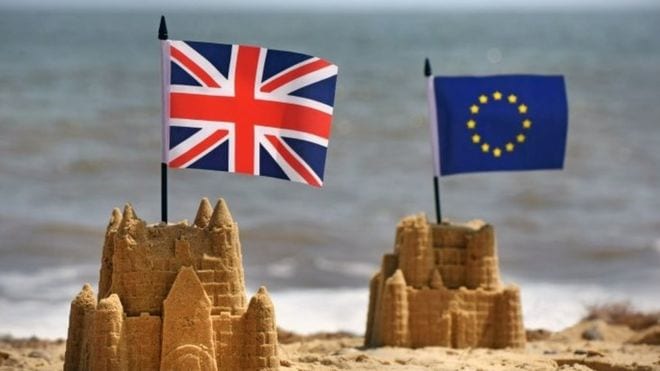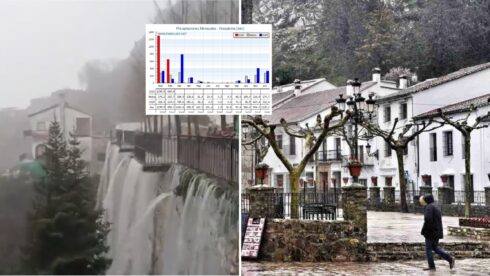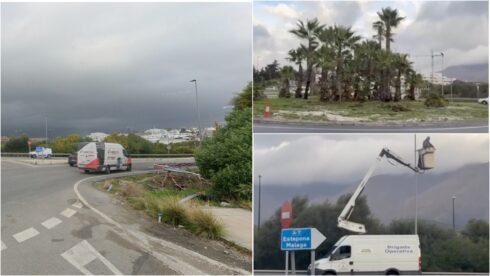 SPAIN has sought to assuage British expat concerns of a no-deal Brexit by agreeing to further assurances.
SPAIN has sought to assuage British expat concerns of a no-deal Brexit by agreeing to further assurances.
According to campaigner Michael Harris, the Spanish Foreign Ministry, the Interior Ministry and Presidencia met with representatives from EuroCitizens on February 6.
While a concrete law will not be passed until early March, campaigner Harris said the group received ‘clarification about key points of the Spanish government’s no-deal plans for British residents in Spain.’
Harris said in a statement: “The government aims to make our transition from EU citizens to third-country nationals as simple as possible, though everything will be conditional on reciprocity and the UK government’s treatment of Spanish citizens in the UK.”
Below are the main takeaways from Harris’ statement this morning.
Generous ‘grace period’
Sufficient time will be given, in the event of a hard Brexit, for UK residents to register as third-country nationals.
The length of this ‘transition’ period is not definite yet, but it will be sufficient and will also depend on the effective date on which the UK leaves the EU.
How to register as a third-country national
a) Information for registered Britons:
After March 29 your existing EU document (your registration certificate or residence card as a family member of an EU citizen) will continue to be valid until the end of the period of grace even though you are no longer an EU citizen. During this period, you will have to apply for new third-country ID, a Tarjeta de Identificación de Extranjeros (TIE).
The procedure for granting this new status will be ‘practically automatic’ for legally resident UK citizens.
Both the long transition period and the simplified nature of the process are similar to the contingency measures of other EU 27 countries which is promising, though we will need to see all the details: the application form, the cost, help provided for vulnerable groups etc. Our interlocutors at the ministries also promised that extra resources would be allotted to immigration staff (at oficinas de extranjería and comisarias) in provinces with large British populations.
b) Information for non-registered Britons resident before Brexit:
If you and all your family members are not yet registered, eg if you have recently arrived, you should immediately apply at a foreigner’s office (oficina de extranjería) or police station (comisaría) for an EU citizen’s resident document.
If you have been unable to formally submit your application or have not been given an appointment before the withdrawal date, eg, your appointment is given after that date, there will be a specific process for applying for the new third-country ID during the period of grace, as long as you can prove that you were residing in Spain before the 29 March.
So to sum up:
– If you apply for your EU citizen’s resident document before 29 March (or the effective date on which the UK leaves the EU), your application will be considered under the same conditions as current legal UK residents.
– If you are resident but have been unable to formally apply for an EU citizen’s resident document before 29 March (or the effective date on which the UK leaves the UE), you will have to apply directly for the new third-country ID during the period of grace. However, the requirements stipulated by the new law, (that enables no-deal Brexit measures in Spain), will be similar to those for an EU citizen. Your application will be processed through a specific process which will be less demanding than the general residence process for all other third-country nationals.
In all of the above situations, during the period of grace, your residence in Spain will be considered legal.
c) Britons arriving in Spain after Brexit day:
Applications for people arriving after 29 March will be processed in the same way as those for all other third-country nationals, with the corresponding requirements which are considerably more demanding than those for EU citizens, especially for non-working people.
It is also important to point out that, if the UK leaves the EU with no agreement, British citizens who are not registered as residents will, like all other third-country nationals, only be allowed to spend 90 days in any one six-month period and that their exit and entry will be controlled at ports and airports to enforce this.
New documentation
Your new ID card (TIE) will be biometric and will be valid throughout Spain and for travel within the EU-27 along with a passport.
The document will accredit your status as legally-resident third-country nationals (under the régimen general de extranjeros as opposed to our current situation under the régimen de ciudadanos de la UE).
If you have more than five years of legal residence, you will be able to get long-term residence (residencia de larga duración).
If you have less than five years legal residence, you will be able to apply, under the same conditions, for long-term residence after Brexit once you have completed five years residence.
 Working after Brexit
Working after Brexit
If you are employed (por cuenta ajena) or self-employed (por cuenta propia), you will be able to continue working as now.
If you have exercised a profession using UK qualifications before 29/03/19, you will be able to continue to do so.
If you are a Spanish civil servant (funcionario) with British nationality, you will be able to continue your employment even though you are no longer an EU citizen.
Social security coordination
On 30 March, automatic coordination of social security between the UK and the EU will end.
Thus there will have to be a new bilateral agreement covering this area between Spain and the UK or between de the EU and the UK.
This would enable existing social security rights and aggregated pensions to be recognised for Spaniards in the UK and Britons in Spain.
 Healthcare
Healthcare
The existing S1 scheme and EHIC card will also stop automatically in the event of a hard Brexit.
A new agreement between Spain and the UK will have to be reached which reflects the true costs of the healthcare for the roughly 77,000 British UK pensioners in Spain compared with the mere hundreds of Spanish pensioners in Britain (to maintain access to public health for UK nationals as now).
Click here to read more News from The Olive Press.










